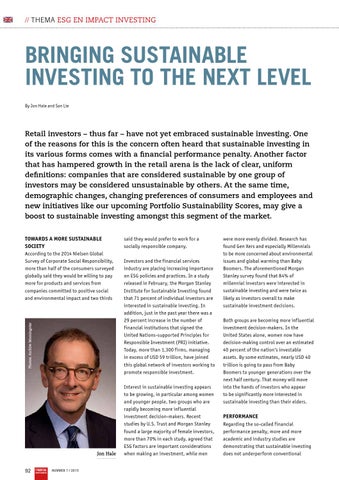// THEMA ESG en Impact Investing
Bringing sustainable investing to the next level By Jon Hale and San Lie
Retail investors – thus far – have not yet embraced sustainable investing. One of the reasons for this is the concern often heard that sustainable investing in its various forms comes with a financial performance penalty. Another factor that has hampered growth in the retail arena is the lack of clear, uniform definitions: companies that are considered sustainable by one group of investors may be considered unsustainable by others. At the same time, demographic changes, changing preferences of consumers and employees and new initiatives like our upcoming Portfolio Sustainability Scores, may give a boost to sustainable investing amongst this segment of the market. Towards a More Sustainable Society
Photos: Archive Morningstar
According to the 2014 Nielsen Global Survey of Corporate Social Responsibility, more than half of the consumers surveyed globally said they would be willing to pay more for products and services from companies committed to positive social and environmental impact and two thirds
Jon Hale
92
FINANCIAL INVESTIGATOR
NUMMER 7 / 2015
said they would prefer to work for a socially responsible company. Investors and the financial services industry are placing increasing importance on ESG policies and practices. In a study released in February, the Morgan Stanley Institute for Sustainable Investing found that 71 percent of individual investors are interested in sustainable investing. In addition, just in the past year there was a 29 percent increase in the number of financial institutions that signed the United Nations-supported Principles for Responsible Investment (PRI) initiative. Today, more than 1,300 firms, managing in excess of USD 59 trillion, have joined this global network of investors working to promote responsible investment. Interest in sustainable investing appears to be growing, in particular among women and younger people, two groups who are rapidly becoming more influential investment decision-makers. Recent studies by U.S. Trust and Morgan Stanley found a large majority of female investors, more than 70% in each study, agreed that ESG factors are important considerations when making an investment, while men
were more evenly divided. Research has found Gen Xers and especially Millennials to be more concerned about environmental issues and global warming than Baby Boomers. The aforementioned Morgan Stanley survey found that 84% of millennial investors were interested in sustainable investing and were twice as likely as investors overall to make sustainable investment decisions. Both groups are becoming more influential investment decision-makers. In the United States alone, women now have decision-making control over an estimated 40 percent of the nation’s investable assets. By some estimates, nearly USD 40 trillion is going to pass from Baby Boomers to younger generations over the next half century. That money will move into the hands of investors who appear to be significantly more interested in sustainable investing than their elders.
Performance Regarding the so-called financial performance penalty, more and more academic and industry studies are demonstrating that sustainable investing does not underperform conventional
